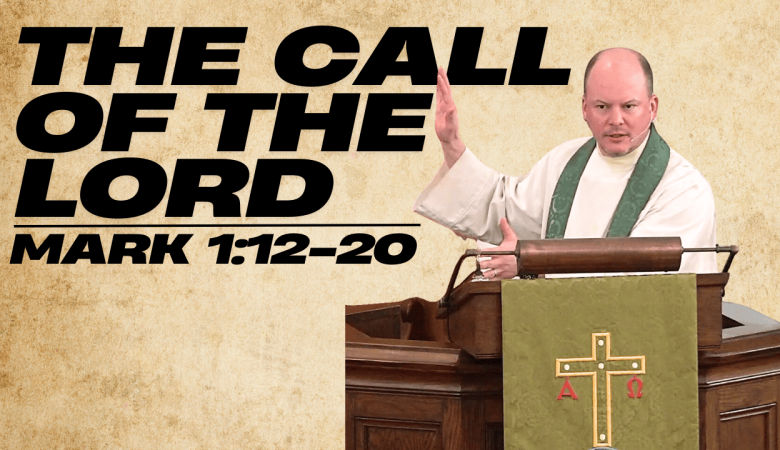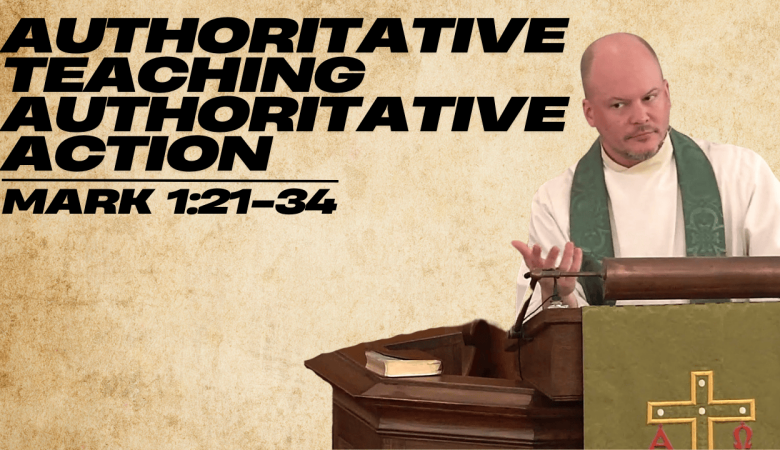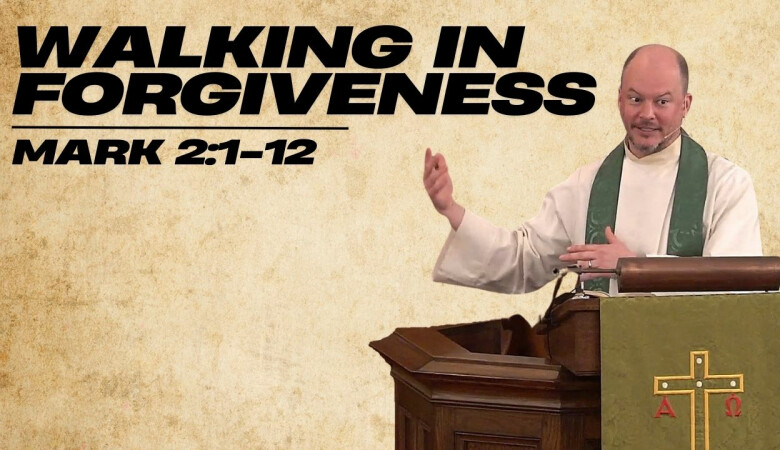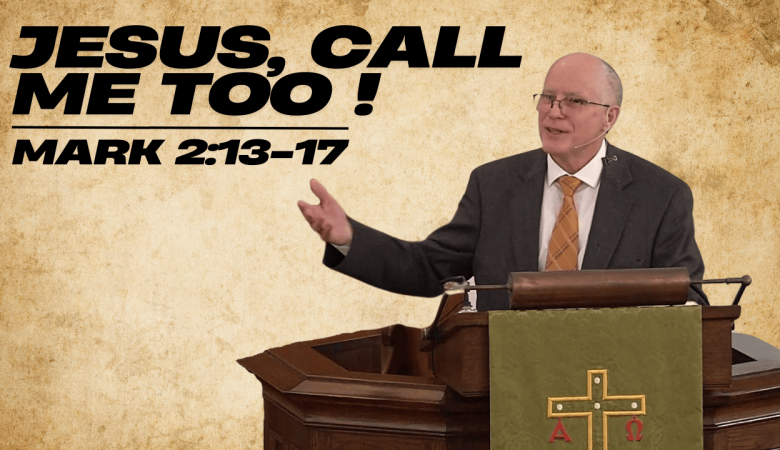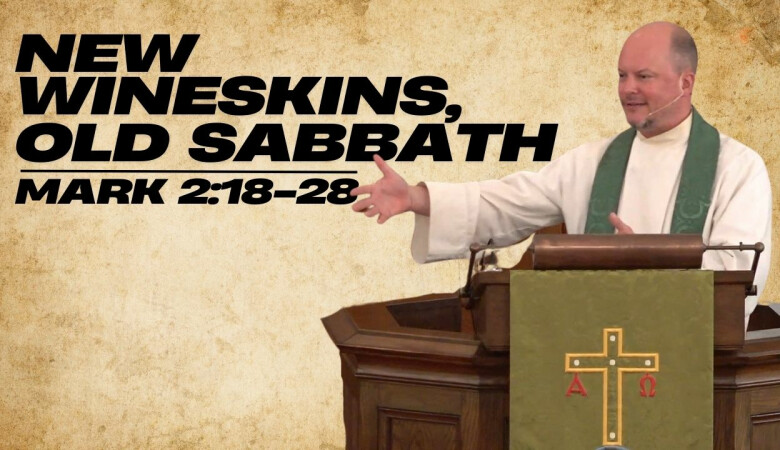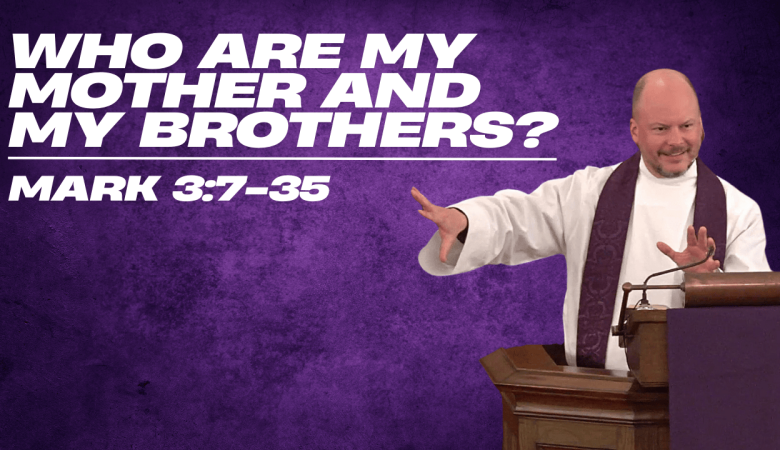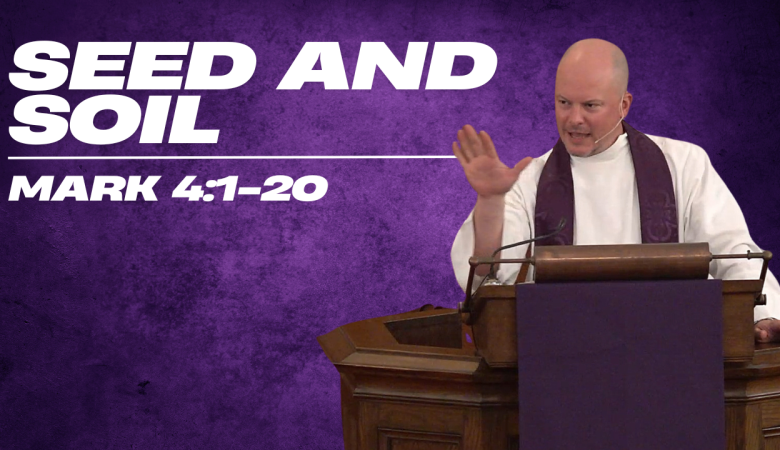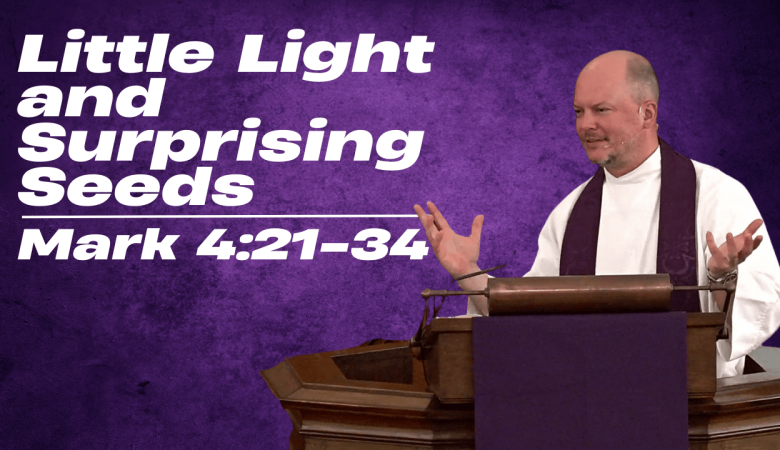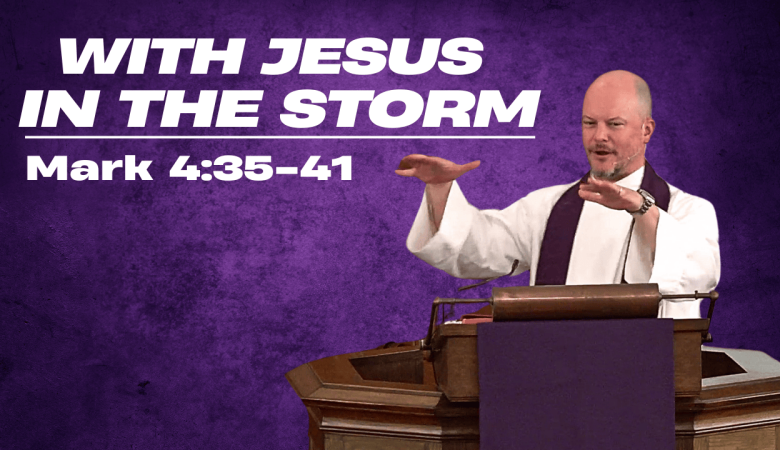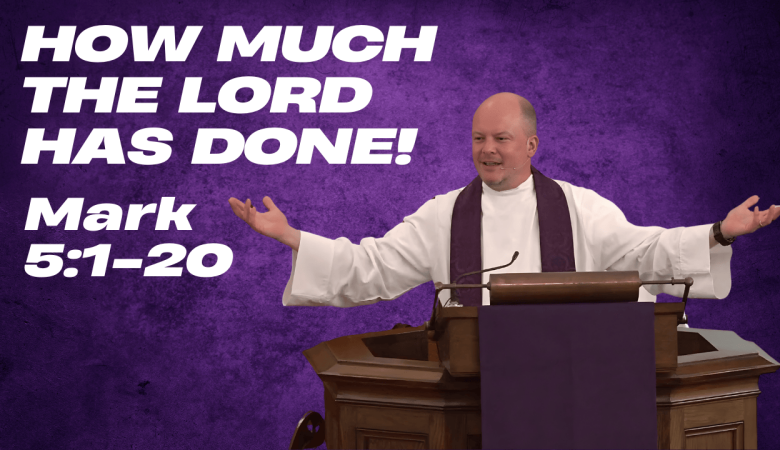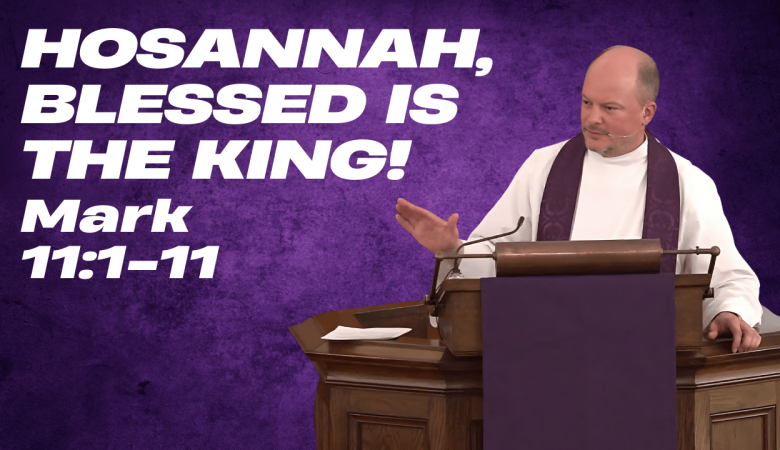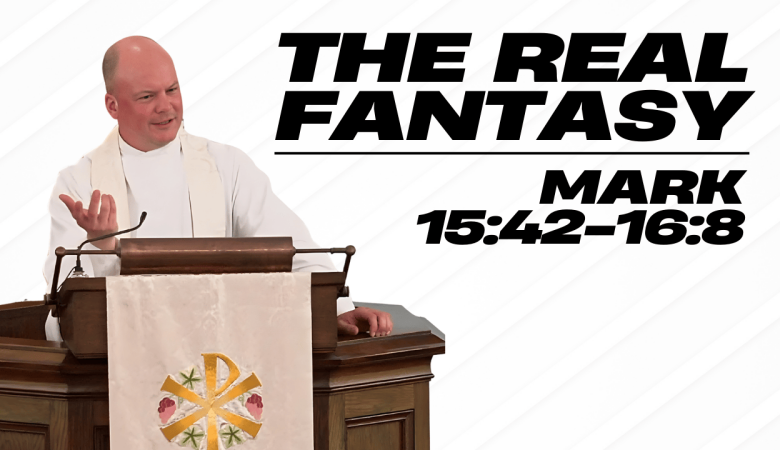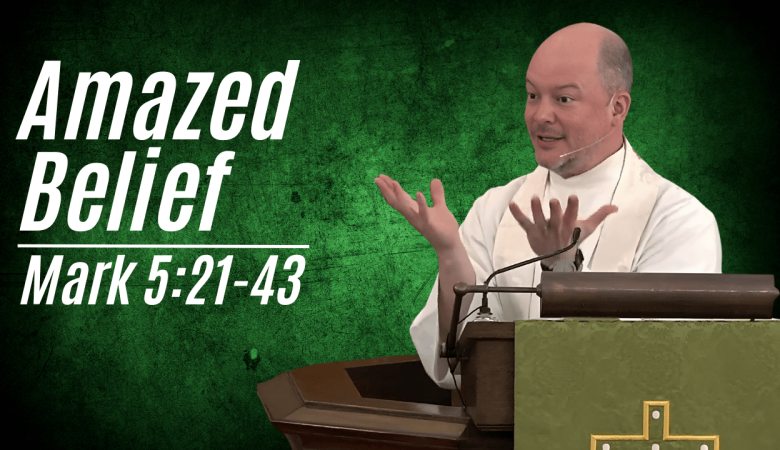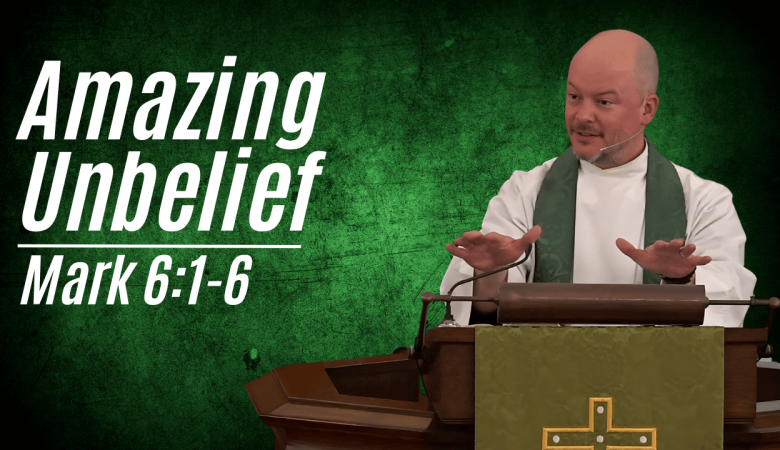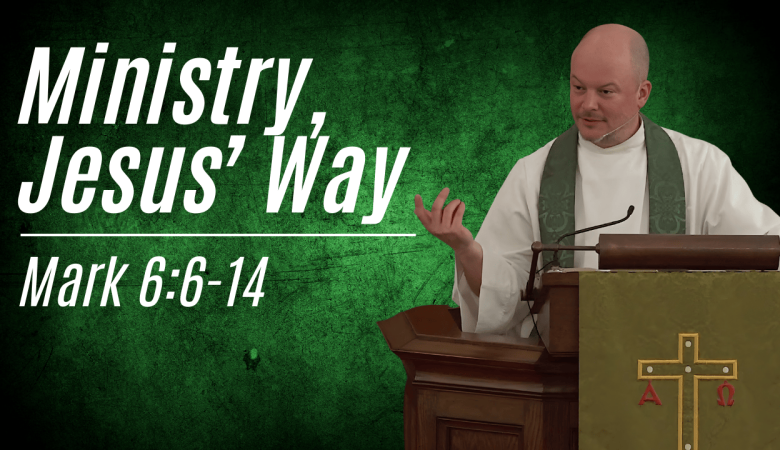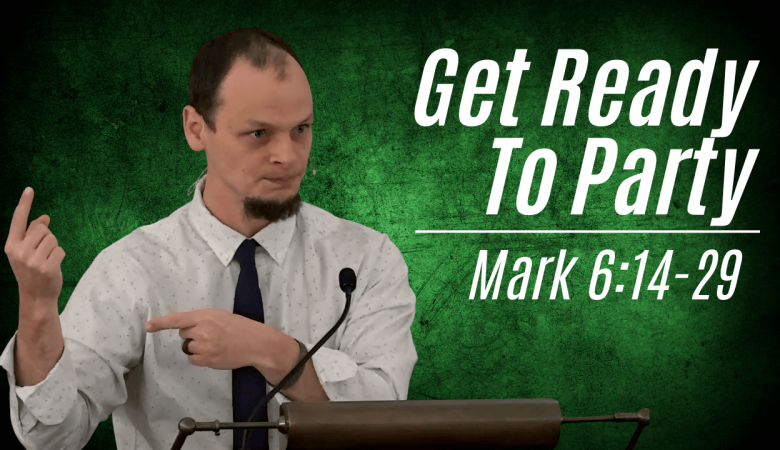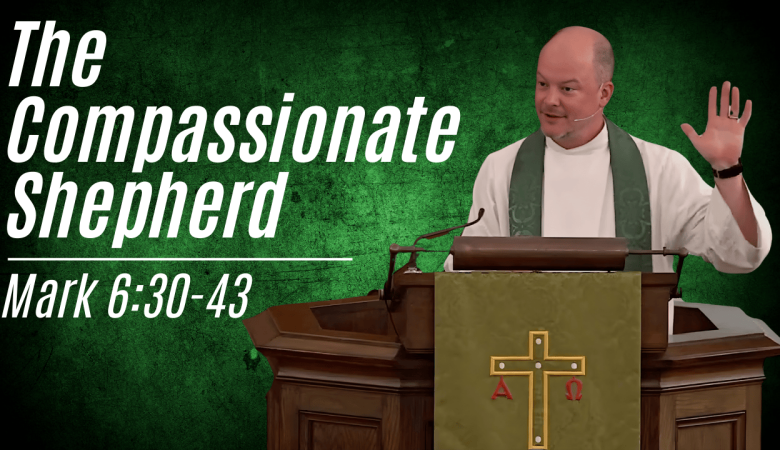Series: The Gospel of Mark
Going In, Moving Out
February 02, 2025 | Peter Rowan
Passage: Mark 1:35-45
Summary
Jesus often withdrew from the pressures of his ministry to spend time in prayer seeking his father. . Jesus was fully God and fully man. So, like us, his seeking fellowship with God the father was not unusual. He shows us how to be fully human. Like other great leaders in scripture, think David or Daniel, Jesus maintained deep communion with God by frequent, often solitary, prayer. His effectiveness for the kingdom seems to flow directly from his connected relationship with his Father. It equips Jesus to reach out and heal - as sign of his divinity.
Transcript
Lord, we are so grateful for these accounts of your life in the world, Lord Jesus, how you had such compassion on those in need and how that compassion drove you to the cross and your death, and yet how your life continues in the resurrection. How your compassion continues, God, I pray even now as we give our attention to this text from Mark, Lord, that you would open our eyes and that we'd see you more and more as lovely and to be desired and precious. To be desired more than gold and silver and to be sweeter than honey from the honeycomb, Lord, that we would find in you are all in all, Lord, speak to us this morning, please. We ask in your precious name. Amen.
All right. Martin Luther said this. He said many things that are worth quoting, but this one fits my sermon. I have so much to do. I cannot get on without spending three hours a day in prayer.
Maybe you've heard this. I have read that Mother Teresa would spend three hours a day in prayer or she would say, communion with God in worship and prayer.
And my guess is that when I share of those two giants of Christian faith. You have a couple reactions that I share with you. The first is just the feeling of guilt. And I think of how little time, comparatively, I've given my life to communion with God. And I'm comforted, at least somewhat, by the great Scottish 19th century preacher Alexander White, who said, there's nothing we do so bad all of our days than pray.
There are times in my life that I would rather die than pray. Okay, somebody gets me. The second reaction you might have to Martin Luther and Mother Teresa spending three hours a day in prayer and communion with God is this, which I also share. How, how, you know, you might be thinking, well, okay, Martin Luther was a monk for a while. Maybe that was what, the time he was referring to Mother Teresa, you know, singleness.
But then you think of how unbelievably productive their lives were, how much they accomplished in the short span of their years. And then I think of all the clothes that we have to fold, many of which I don't do. Sorry, programs we have to set up kids to run to this event, to that event, ESL to teach. The list just goes on and on.
So I was comforted when I read that Charles Spurchon, that great Baptist preacher of London in the latter half of the 19th century, when he was told that there was a man who spent three hours in prayer, this was his response. I could not do it if eternity depended on it. Yeah, there's my man.
And prayer is not exactly the focus of this sermon. But life with God is. And the effect of life with God. And the truth is actually that though Spurgeon did say that he felt spending three hours of prayer would have been impossible, he also was deeply devoted to a constant life with God. And he wrote quite a bit about the idea of praying constantly throughout your day and giving your life to communion with God.
But you know, we all have these desires for ourselves and for our community and you know, for our families and our friendships and our workplaces. Hopes that the world might be better, right? Greater peace. I mean, part of the reason why many of you devote your Monday evenings to the work of esl, to caring for these refugees who have come into our place and to loving them in Jesus name is because you desire their well being and the well being of the world, which is a good and holy desire. But you have this desire for the presence of God, right?
Which Jesus says in his presence the kingdom of God is there and people are brought to wholeness and to peace and to new life. And you desire that in the world. We all do in different ways at times, but we all have this great desire, this great hope for goodness and the effects of good news to, to be brought to bear in all the areas of life. And so there's a part of us that has this, we have this temptation. We think how, okay, we have this feeling of guilt maybe, but we think how is that possible to spend all this time in prayer by these great titans of the faith.
But then we also think, why shouldn't the Christian life be a life of action? So much that needs to be accomplished in the world.
Okay, so Jesus, we've already seen in the beginning of Mark here, Jesus comes as the greater Elijah. Maybe you remember I mentioned that. Really, really John is the greater Elijah, but Jesus comes actually as the greater John. John tells us he also comes, you know, as the greater David, the greater Moses and the greater Daniel. And we see those themes, some in Mark, but also in Matthew and in other places.
And all of these people who accomplished so much in the scriptures had this deep life of communion with God. You think of the Psalms, nearly all of them are prayers really, that's what they are. And they're prayers to God. And most, the great majority of them were written by David, this man who lived a life of communion and prayer with the Lord and yet did unbelievably great things. James tells us about Elijah.
This, the book of James in the New Testament. Elijah was a man with a nature like ours. And he prayed fervently that it might not rain. And for three years and six months it did not rain on the earth. Then he prayed again and the heavens gave rain and the earth bore fruit.
You know, prayer actually having an active life affecting this world. This great man who gave himself life of prayer, accomplished so much. And of course you think of Daniel, right, living in Babylon, exiled, taken away from his family, you know, the life that he knew and the life inside the Holy land there. And he was brought to this foreign land, this exiled place where they worshiped other gods and demanded various things of him. And yet he committed himself.
You remember the great story of Daniel and the lion's den children who are not children of worship. You know this at least as well as your parents do, I bet. You know, he prayed through three times a day, right? And when he was told not to do it, what did he do? He kept doing it.
And out of that, actually what we find a few times in the life of Daniel is that he is given actually more and greater responsibility in the life of this place where he finds himself in exile. It's almost as though the prayer actually this communion with God, this life with God, actually pressed him into a greater effectiveness in the world. So this is what I'm suggesting to you this morning. There is this direct connection that we see in scripture, but we also see actually just in life between life spent with God and life brought, God's life brought to bear in the world. We desire this wholeness and we desire this peace and this well being for our community.
And that temptation often is to think that demands that we simply do, do, do. Don't give your life to the community group or to the prayer life, or this time that you've come together this morning. Instead we rise early and go to bed late, as Psalm 127 says, eating the bread of anxious toil. Just the anxiety that overcomes us of all that must be accomplished in life. But I want you to see this morning how this text that we have in Mark has this movement, okay, from life with God to bringing the life of God into bear in his world and the life of God towards others.
So the first thing is just this kind committed life with God. I'm going to refer to our text quite a few times. So if you open it up, I want you to see where I'm pointing you to. We're in the last two paragraphs there of chapter one of Mark. So one verse 35 and verse 36 tell us this.
And rising very early in the morning, while it was still dark, he departed and went out to a desolate place. And there he prayed. I'm just going to read 36 also. And Simon and those who were with him searched for him. So what we see here is that Jesus himself, the very second person of the Trinity, devotes himself to life with the Father, prayer life, sharing his life with his Father, with His Heavenly Father.
And we saw last week that Jesus was in the synagogue on the Sabbath day. And I said that elsewhere. Actually, we're told that that was his habit to give his time to the worship of God with God's people. But we also know that this is true. We have this quite a bit in the Gospels that Jesus retreats and spends time in prayer with the Father.
We see here that he went to a desolate place is what it says at the end there of verse 35. But that word desolate place is the word Ahriman. And interestingly enough, that very word has already been mentioned four times in Mark chapter one. And every time that that has been mentioned in Mark chapter one, the translators translated it wilderness. But for some reason here they didn't remember this.
John was in the wilderness preaching about the kingdom, right? John was in the wilderness, baptizing. That's where Jesus went to be baptized in the Jordan. There's the wilderness. It was into the wilderness in which Jesus was led by the Holy Spirit.
But it's there that we also learn that there were the wild beasts and the angels were ministering to him. But that's also the place where Satan tempts him, where he says, ah, he's in a weak place, tempt him. But what you find in each one of those instances is it was the place where God met his people, where God sustained his people, where God spoke to his people, where God, you know, descends as the dove and the voice over Jesus there. Now, I'm going to get back to that idea in a moment, but I want you to see before I get back to that sort of the beginning of how the next story works. Okay?
So look with me down at the next paragraph. It begins in verse 40. And I'm just going to read the beginning here, okay? And a leper came to him, imploring him and kneeling, said to him, if you will, you can make me clean.
Now, I was just saying that I think you might miss something. If you just read A Desolate Place, you're missing the connection with wilderness. Right? But there's something else going on here that's really interesting in the Greek. And actually the English does kind of get it?
But I think it's somewhat still lost on us. Okay, so let me read this first part again. And a leopard came to him, imploring him and kneeling, said to him.
It's possible in English, and it's also possible in Greek, which is what this was originally written in, for it to happen. Written this way. And a leopard came to Jesus, imploring and kneeling, saying. You know what I'm saying? But in the Greek, and actually the English translators did a really good job here.
Three times it says the leper came, you know, imploring, came to him, imploring him, kneeling, said to him. And the hymn is always there. It's right there. And the author doesn't need to do that. But there's something really, really important happening here.
This man is going to Jesus. He's spending time with Jesus. He's kneeling before Jesus. And actually what we have, we with these verbs that are being used here is what we're invited to picture is this man is praying, right? He has the posture of prayer.
He's kneeling. He is imploring. He's asking. What this man is doing is he is doing what Jesus just did, right? In verse 35, he's going to pray.
He's coming to Jesus to pray. Okay? What I'm hoping that you're seeing is that both these stories in some ways are telling the same story. And they're both beginning with life in devotion to God, life spent with God in prayer. You'll remember this.
Sorry, let me back up here. So Jesus goes out to the wilderness. He goes out to a place of isolation. So far, actually, interestingly, that the others have to search for him. So he's not just kind of around the bend where everybody's like, hey, Jesus.
Hey, I'm right over here. Right? He's actually far off in a place of isolation, but they have to actually go out and search, okay? And this leopard man comes to ask for help, and we're told three times that he comes specifically to Jesus to ask for help. And so both are sort of in this isolated place, Jesus with the Father.
And at least the picture we get is this man just with him, right? There's this connection here that's taking place. And so what I'm suggesting to you is that both of these stories begin with this idea of devotion to God, but also, in a sense, there's isolated devotion to God. Now, when you think of the wilderness, I want you to again remember that this was the place of the wild animals that Mark mentioned. And specifically, it's also the place of temptation.
It's a place of hardship. And so Jesus, if you remember the other stories from Matthew and Luke, he's hungry. And that's actually what Satan tempts him with. Hey, you know, in your hardship that you're experiencing, hey, maybe I can tempt you with that. You know, in your powerlessness, in your weakness, in your isolation in the wilderness, maybe I can tempt you with that.
But it's in that place also, actually, that the spirit meets him and leads him. And the angels, we're told, minister to him. So here's this man. He's also in isolation. And the text doesn't necessarily tell us that, but I'm telling you, it does tell us that because it tells us from the beginning he's a leper, which would have meant that he would have actually been totally socially estranged.
And really what it largely also would have meant is that if he was going through town, he would have been yelling out, unclean, Unclean. Meaning, don't come near me, you're going to get sick if you touch me, don't come near me. Which means that he would have not been welcomed to places of worship. You know, he wouldn't have gone to your dinner party. He would not have been welcomed into the synagogue.
He would not have been at Thanksgiving family gatherings. He would have lived his life in isolation and alone.
There are a couple encouragements, I think, here for us. Okay, so Jesus in isolation, this man in isolation.
Some of you, I have no question, no doubt in my mind, some of you feel very isolated. And maybe you feel isolated in some areas of your life and not others, but you feel very isolated. Maybe you've told others about that and maybe you haven't. Okay, maybe you feel isolated in the political world. It's probably easy right now.
Maybe you feel isolated in the church world.
Maybe you feel isolated because you are single and you want to be married. Or maybe you feel isolated because you are single and you don't want to be married, but your friends are. And that feels weird and strange and you feel lonely in that maybe you feel isolated just because you have so many questions and doubts about God and faith and the world. And you're kind of like, I don't think others share these, feel these.
But I think there's something incredibly encouraging in this text, in both these passages, and that Jesus, God the Father, meets with Jesus in his isolation, and Jesus meets with this man in his isolation. And actually, you could extrapolate this through Scripture, that it's actually often in our isolation, in our hardship, that God actually comes closest to us and nearest to us, us. It seems to be a theme in the Bible that it's actually in the wild places, in the wilderness that God comes and he ministers most closely to us. So one thing we see here is that God meets with the isolated and in the places of isolation, right in the wilderness places. God often does meet us in the Ahrimans, and this is the fifth time it's mentioned in this chapter.
We're supposed to highlight that God's doing something in those places.
And the truth is that many of you know that to be the case in your life. The other encouragement, though, is that this man comes to Jesus and he says, if you are able, and Jesus is absolutely able in that isolated place, this man comes to Jesus and he's like, you know, I've been isolated for so long, this guy's supposedly healing people. I think I'll just kind of go to him and wonder out loud with him, God, are you there?
I feel so lonely and I'm so estranged and I'm weak. Maybe, maybe you could show up if you're able. Would you do this? And Jesus says, I'll take that. So maybe you need to receive some encouragement just to come to Jesus and say, if you're willing, would you meet me?
Would you work on me? Would you work through me? So verse 40, again, sort of at the end, it says, if you will, you can make me clean and move with pity. He stretched out his hand and touched him and said to him, I will be clean. And then 42 says, and immediately the leper, leprosy left, left him, and he was made clean.
Now you hear all that clean language. And the reason why this man lived in isolation and alone was because. Well, quite frankly, it's because he would have been contagious, okay? There's something going on there. And no one was supposed to touch him because.
And he wasn't supposed to touch others because he wasn't supposed to spread the disease around. But there was. There were also all these rules around this kind of thing in the Mosaic Law in the Old Testament. And if you had these certain kinds of diseases, you couldn't be around anyone and you were declared unclean. Okay?
These are these rituals of purification. So here's what would happen. If you're unclean and you touch somebody else or they touch you, that other person becomes unclean. That's how it worked, you know. And here's the thing, right?
Like, it's like this.
Somebody has a birthday party, you know. And if you find out that half the people at that birthday party are sick, and you're like, well, okay, my child's not sick yet, but that other kid was sick. He. You know what? I probably shouldn't send my kid over to that kid's house.
You get what I mean? Like, there's this kind of thing. You're like, okay, let's just make sure everybody's clean. So you had to go to the priest. So the priest goes, yeah, you're okay.
Go hang out with other people. It sounds initially weird to us to use kind of this language, but think of it as like an ancient medical practice in a way, for the good of the community. Okay.
Anyway, there's a detail here that I think is really worth pointing out to you. This man, it says, well, it says this, and moved with pity, he, Jesus, stretched out his hand and touched him. Nobody was supposed to do that. You weren't supposed to do that. You would become unclean if you did that.
But actually, that's not how it works with Jesus.
The next chapter, Jesus tells this. Those who are well have no need of a physician. But those who are sick, I came not to call the righteous, but sinners. And by which he's saying, I am the great physician. I am the great healer.
Jesus doesn't become unclean from touching something that's unclean. The purity rules. The rules of purification work that way in the Old Testament. But in Jesus, they're totally reversed.
For everyone else to touch this man would have made them unclean. But for Jesus, it's purity that's contagious, not impurity. It's cleanliness that's contagious, not uncleanliness. John Chrysostom, who's a great preacher in the 4th century, he's actually called Golden Tongue. That was his nickname.
He was the archbishop of Constantinople. He said, how did. He did not simply say, I will be clean, but he also extended his hand and touched him. Why did he add the and touched of his hand? For no other reason, it seems to me, than that he might signify.
But by this he has undone the hand of the law. Jesus saying, it's totally different with me. Totally different. See, Jesus invades the dark places, right? He invades the unclean places, the impurity of our world and of our sin.
And he brings his light into the dark places. He brings his purity into the impure places. He brings his cleanliness into the unclean places.
So this is sort of this first main point, this life with God point. And we see this Devotion to the Father with Jesus himself. But then we also see this repeated for us in this man coming to him, imploring him, kneeling before him. There's this communion with God that's taking place here. Jesus and the Father and this man with Jesus.
And we begin to see how this changes things. But I want you to see how in both of these stories, there's this outward movement that takes place, and it comes from this dwelling with God, okay? And that's the trajectory. It's the only trajectory. So the second point is how this life with God actually brings others into communion with God.
So back at the first paragraph, you know, verse 36, and Simon and those who were with him searched for him and they found him and said to him, everyone's looking for you. And Jesus basically is like, yeah, let's go, let's do this. Or as Mark said it, he says it more like this, let us go out. Which does not sound quite as exciting, but you need to hear it in the excitement. Okay, let us go out to the next town that I may preach there also, for that is why I've come.
He's found. He's like, yes, from having this time with my Father. Let's go. Let's do. Let's speak.
Let's do this kingdom of God thing in the world. And it says he went throughout all Galilee preaching and casting out demons. Life with God that morning produced word and deed for the blessing of others. That's how it goes. That's the trajectory out of time with the Father, Jesus goes out into the world to bring the reality of the kingdom of God to bear in the world.
And the forces of Satan specifically casting out demons is combated. And the good news is proclaimed in people's lives are changed, but it is out of that time first with the Father, that pushes him out into the world. And the same movement happens in the next paragraph. Okay, so Jesus has compassion, sense, pity, in our translation there. And he stretches out his arm and he touches this leopard.
And again, like, keep in mind, likely nobody had touched this man for a long time, but out of compassion, Jesus touches him. And then after he. After he's healed, it says this actually says immediately. That's one of Mark's favorite verse words. I don't know if you noticed that last week I mentioned immediately a few times.
So verse 42. And immediately the leprosy left him and he was made clean. Verse 43. And Jesus sternly charged him and sent him away at once. And it seems maybe strange from Jesus to go from Such a compassionate Jesus who we just want to hug to somebody who's stern and strong.
And Jesus at least seems very, very intense.
And there's a few. So he's very intent in saying this. Don't talk to other people about what happened. And maybe you know, that this Jesus actually tells people this quite a few times in the new. In the Gospels, don't go say what I did.
And there's a lot of questions about why he did that. And there's a few different answers. There's a few different answers for this passage. Let me share with you two of them. One of the answers to why he would do this, why he would shift so quick from the stance of compassion to this stern man telling him not to share, was that Jesus didn't want other people to know what was going on.
He didn't want to spread too quickly. He had this life of ministry yet to do. He had three more years before he would go to the cross. And he wanted to have this long ministry of preaching and healing and bringing the light to the darkness and bringing the good news of God to the world. So he was careful that he didn't want to be found out too quickly.
And there is truth in that. Okay, I do think the second explanation makes a little more sense, but I think there's actually a mix of the two. I'll get to that.
So the other thought is that he sternly charges him because he actually wanted this man to be fully alive and fully a part of the community. Think of this man who's lived in this isolation. Jesus says, God doesn't make you for isolation. He. He makes you for community.
And I want you to be a full part of the community. And this man, who's been known probably for a long time to be unclean, he's been yelling throughout the streets, hey, unclean. Don't come near me. And he hasn't been invited into any parties. If all of a sudden he came up to you and he was like, hey, I'm clean.
Are you going to be like, I'll give me a hug. No, you're not. Okay. You're not going to do that. You're going to be like, yeah, right.
I don't want to get leprosy. Please stay away. You're weird. That'll be your response. But if you go through the proper channels and the priest is able to kind of, you know, go over, look over you like a doctor would and say, actually, yeah, this man does not have any leprosy, and he's coming, he's offered the right, you know, sacrifices for the purification, and I've checked him out and community you need, by the authority given to me as a priest, you need to welcome this man fully into your life together.
Jesus is caring for him and being so stern, he's saying, hey, this is actually. It's going to be easier for you if you don't go hugging people right now and you go to the priest first. Okay? Now, I think the best understanding of these is putting them together in a way, because what Jesus actually is doing is threatening the authority of the religious leaders. He has said, I'm going to declare to you what's clean and unclean.
I'll be the one that tells you if you're clean or not. So there is that challenge to the religious authorities that's going to ultimately get him killed. But he also is caring for this man and saying, hey, it's going to be easier for you if you take this route. Right?
But that's not exactly my point. Here's my point with this story. This man does not listen to Jesus.
I mean, Jesus, who just healed you from your leprosy, sternly charged, you don't tell other people about this. And this man's like, I gotta go tell people. And it's not. I don't think you can take this man necessarily as rebellious, you know, oh, I don't care what that guy says. All he did was heal me.
If somebody healed you, you'd be like, I probably do care what that guy says now. But he couldn't help himself. He couldn't help but share what God had done for him. That is what happens. That man has met God in Christ Jesus.
He has been healed. And he cannot help but tell others about it. He cannot help but act in light of that healing. Jesus meets with the Father in prayer and he goes out from that communion with God which we believe God exists as love. The Father, Son and Holy Spirit in perfect harmony.
And he goes out of that communion with the Father and he says, others need to hear the good news. Light needs to go out into darkness. Satan's kingdom needs to be thwarted because of the perfect, harmonious love of the Father. Son and Spirit needs to go out into the world. And this man says, I have been cleansed.
I have been healed. Light has shown into the dark places of my life, and I have to go out and share what has happened. I mean, Mother Teresa and Martin Luther spent all of that time in prayer. And it was precisely because they did that they led such productive lives for the Kingdom of God.
And I totally know that it's tempting to think of all that we have to do, right, for our kids and for our parents that are getting older and for the promotion that we desire to get in our workplace. And our desires to stay physically fit on some level as middle aged men or whatever you find yourself to be, and our need to practice some level of self care for our mental state and all these kinds of things. I know all that and I know how that can take up so much time in our days and in our weeks, in our months, and they become how we spend our lives. And all these things that we do, do and do, many of which are great, many of which are great. But if you want to see the kingdom of God come to bear in this world, if you want to see the forces of Satan pushed back, the healing of God brought to bear into this life, then you have to prioritize the presence of God.
It is simply a rule of Christian life. You have to prioritize being in God's presence.
The movement of the good news is first that we receive and then we give. And you cannot give what you do not have.
I mean, the good news is not that you have to get your life all together, right, and then come to God, then He'll receive you.
The good news is not that you have to show how you serve the outcast and the poor and the refugee and all the rest. Then God will receive you. It's the exact opposite. The movement is first that God heals you, that you're present to him, he speaks to you, that he heals you from your uncleanliness. And then he sends you out to do the good works of the Kingdom of God.
I think about this just in light of our worship, what we're doing right now, right, we gather together each week in here to worship and we do these same things again and again. And some people of course, say, why do you do all this stuff the same? So I mean, it's like the same every week. And partly because we're very forgetful, but also because we want these things to become our habits, right?
But we do this because we actually desire God's life to be born in our own lives. We desire the life of God in the world. And so what we do each week, right, we have this thing called the call to worship, where God says, hey, you've been a long ways from me. You're aliens, you know, which means the people from way, way, way out there, not very close, but he's like, I want to make you my children. Come.
Come back. Come to myself. You've been sinning. You're following your own foolish ways. Come back to me.
That's the first movement, right? We hear that God wants us, actually desires our presence, despite our, you know, running in other directions so often. And then we have this movement of confession and forgiveness, and we hear that God forgives us.
What Jess and Amy was saying, despite the fact that we are sinners and we screw up, God says, I actually desire you, and I forgive you, and I want to be near you. And we hear, God teach us, you know, we're ignorant. And we say, lord, teach us your ways. We want to know you. We want to grow.
And we receive his food because at the table, because we are hungry people and we need to be nourished. And God says, I want to feed you. I'm going to feed you with what you need. And then he sends us out, right? The blessing of God.
And he sends us out to be his presence, his hands and his feet in the world. But it's out of having been with him that he sends us out into the world. And he sends us out to do the very things that we've actually been doing. Calling other people to God, but also calling people to us. You're far off.
I want you to be near. You feel isolated and alone. Don't be like that. Come. Can I welcome you, Hear God welcome you most of all.
But hear me welcome you also, you, alien and stranger. He sends us out to bring his forgiveness to damaged marriages, hurt friendships. He longs for us to extend the forgiveness that we have been given and to have healed relationships.
He sends us out to teach others and to learn together, like in community groups and like, you know, literally teaching people how to learn English, like the ESL ministry to caring for those who need to learn. That's being, you know, the hands and feet of Jesus out into the world. Having received it from him, He. He sends us out to care for the hungry and for the poor. The very thing Paul says we were eager to do right at the end of Acts 15, to remember the poor.
What I'm saying is that time spent with God is never wasted. And time spent with God is the impulse for the things that we most desire. The kingdom of God coming to bear in the lights of the world. And this is the movement, and it is only that way. You go the other direction, you will only get burnout.
You only get striving God, look at all the things I did. Look at, you know, look at how I care for this person, that person trying to earn the presence of God never works is a free gift offered to you. But having received that, God always sends us out, he always pushes us out. And we're always compelled to go out and to share what we've been given.
Time spent with God is never wasted. Time spent with God is the beginning, the foundation, the fountain from which true life is born in the world. Let me pray for us. Lord, speak to us in this God, not with guilt which we are so inclined to run towards.
May our response not be with excuse after excuse, but with with greater desire, Lord, for you. A greater longing to know you, to be known by you. The greater desire to cast our cares upon you because you care for us. Greater desire to come to you and say, if you will, you can make me clean and receive your cleansing touch, God. A greater desire to retreat to the isolated places, to be in prayer, to be in fellowship and to speak with our Heavenly Father, God.
Would this be true of us in this church? Would we be a church that are devoted to practicing the presence of God? To add what we think sometimes lingering with you, simply being with you, and then God push us into your world with new energy and new life.
That those who are lost might be found, that those who are sick might be well.
That the hope of the poor might not be taken away, that the good news of forgiveness of sins might be declared.
The forces of Satan's sin and death would come to nothing. Because we have been your people, we have been with you. And you have sent us out to be your mouthpiece in your hands and your feet in this world. Do this in us, please, Lord Jesus, in your name we pray. Amen
Series Information
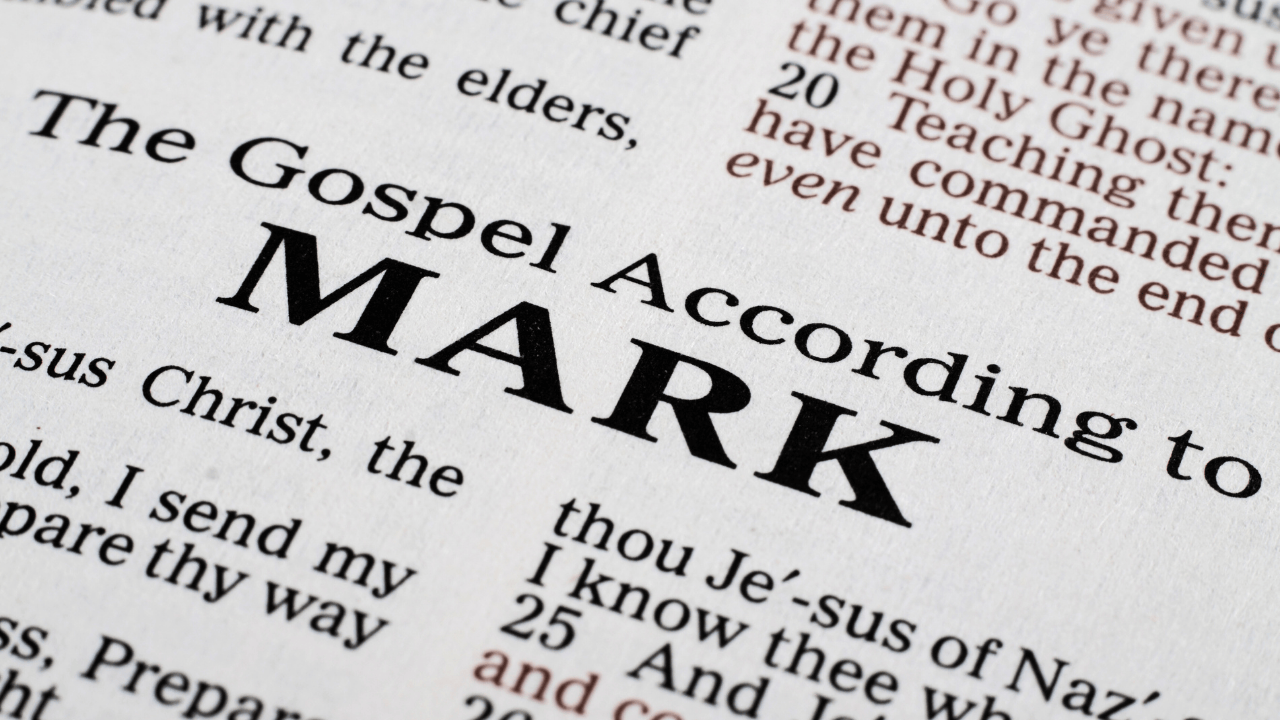
Mark's gospel is fast. He jumps right into what is central to the good news, the gospel, of Jesus. John the Baptist comes, and he is great, but his whole message is one of preparation for the greater one who would come after, Jesus. And everything John says has to do with this comparison of just how great Jesus is. We also see this through the writer of the gospel, Mark, and the apostle who was behind Mark's writing, Peter. Then we quickly move to Jesus' baptism by John and we see here the other central idea of the gospel, that this great one who has come humbles himself to associate and own the sins of humanity. Here is good news!


